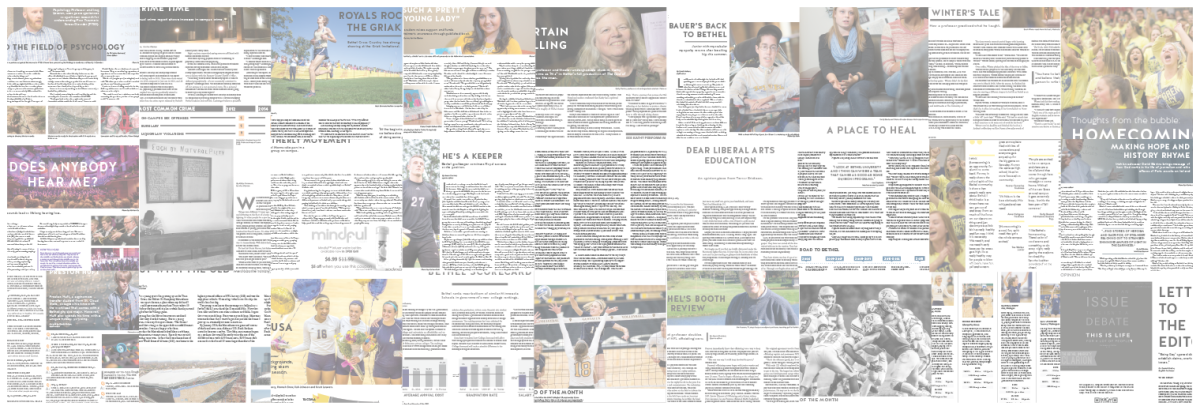Millennials finds themselves disconnected to the voting process of the country, leaving their voice unheard.
Beret Leone | The Clarion
Hip checked and ‘Feel the Bern’ sign deprived, Bethel University sophomore Sydney Gray grudgingly steps back in line to enter Bernie Sanders’ St. Paul rally on Jan. 26. thousands were drawn to the rally varying in ages and nationalities, and among them was the 19-year-old Gray.
Studies from the Pew Research Center show a significant gap in voting trends between the four voter-eligible generations, finding that millennials are the most liberal. It also revealed that millennials, the youngest generation, often choose not to vote at all. Voter turnout at midterm elections has been dismal for millennials, but it isn’t always because of apathy in the election. Sometimes it’s because of lack of information.
Sophomore Mitchell Muras and senior Anna Anderson fall in that category. Neither voted during the last few elections, saying they didn’t do the necessary research to prepare for voting day.
“I had no idea when it was happening or who I would vote for,” Anderson said.
More and more Americans, especially millennials, are choosing to disregard traditional parties. Although their ideologies are liberal, nearly half identify as independent.
“I think it’s the increasing tendency in our culture to not associate with institutions,” Fred Van Geest, Chairman of the Political Science Department said. “Millennials today are really connected to their friends and people on their social networks but not formal institutions.” Although millennials tend to shy away from political parties and campaigns, Van Geest added, that doesn’t mean they aren’t interested in politics.
Although independent identifiers want to be more detached from institutions, they tend to sway toward the Democratic party as they often feel it’s more sympathetic to their views. Millennials are idealistic in the sense they want change. The issues that matter most to millennials are health care, climate change, legalization of marijuana and overall equality. With 43% of the millennial generation made up of ethnic nationalities, they are more likely to choose a candidate who aligns with their lifestyle, all according to Pew.
“If you are in a certain time of life, you’re going to be more aware of those issues,” Van Geest said.
While students like Muras and Anderson said a lack of information kept them out of the polling booth, it’s common, especially among millennials, to feel that political action in the form of voting makes no tangible difference. is lack of political efficacy is arguably the strongest reason that millennial voting numbers are so low.
But getting voters to the polls is only half the battle. Once they get in the booth, that’s when the fun starts.
“I would side more with Bernie Sanders,” sophomore Alicia Barlage said, “but Ted Cruz also has good points- so they contradict.” Barlage hasn’t made up her mind, but she’s not alone. There are nearly seven months until election day and the Republican and Democratic candidates have not been named; many are still assessing the options.
“I think it’s a weird mix this year,” senior Jonah Venegas said. “A lot of the candidates are polarized so it’s hard to know who to vote for.” He pointed out however his hope to not see Donald Trump as our next president.
For a Bethel student who wants to vote in November, he or she must register 21 days prior to the November general election (Oct. 14) in person, by mail or online. If the deadline has passed, there is still the chance to vote on Election Day. Bring a driver’s license or social security card and you can register at the polls before voting. For students living at Bethel, Valentine Hills Elementary is the polling location.
Anna Anderson said she’ll be consulting Google or reaching out to her parents for more info on how to cast an absentee ballot. Registering to vote in Arden Hills, for students, will take the guesswork out of absentee ballots for this upcoming election.
Millennials may not be voting, but they are still highly involved in society in other ways. The younger generation is twice as likely to volunteer in comparison to older generations; this includes involvement in nonprofit organizations, demonstrations and political protests, according to Pew.
Van Geest finds these actions, along with millennial engagement over social media, to be encouraging and is not concerned about the youngest generation’s voting habits. He encourages adults and students alike to recognize the different pockets of culture throughout generations.
“I think you should definitely be cautious about blanket categorizations and generations of people between 18 and 35,” Van Geest said. The demographics of upcoming elections show an overall 5 percent increase in eligible voters. Out of the 5 percent, Hispanics gain an additional 39 million voters this coming election while the white population will see 3.2 million new voters eligible to cast a ballot. With the Hispanic and Black populations both growing in America, there will be a more diverse voice in the 2016 presidential election.
The increases for Hispanic and Black voters are both a result of citizens coming of age to vote. Having a low turnout for young voters at the poll may cut these numbers in half if voting trends for the 2016 election are similar to the 2012 election. 43 percent of the popular vote will be ethnic, but if millennials fail to show up on election day, the number will be signi cantly lower.
If millennials fail to involve themselves in the making of the government, the voice of the masses will become the voice unheard by policy makers and leaders of America.

![Nelson Hall Resident Director Kendall Engelke Davis looks over to see what Resident Assistant Chloe Smith paints. For her weekly 8 p.m. staff development meeting in Nelson Shack April 16, Engelke Davis held a watercolor event to relieve stress. “It’s a unique opportunity to get to really invest and be in [RAs’] lives,” Engelke Davis said, “which I consider such a privilege.”](https://thebuclarion.com/wp-content/uploads/2024/05/041624_KendallEngelkeDavis_Holland_05-1200x800.jpg)















